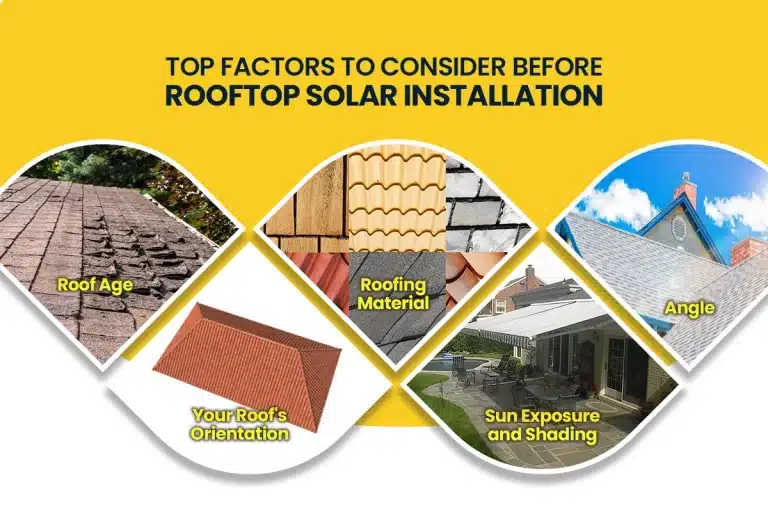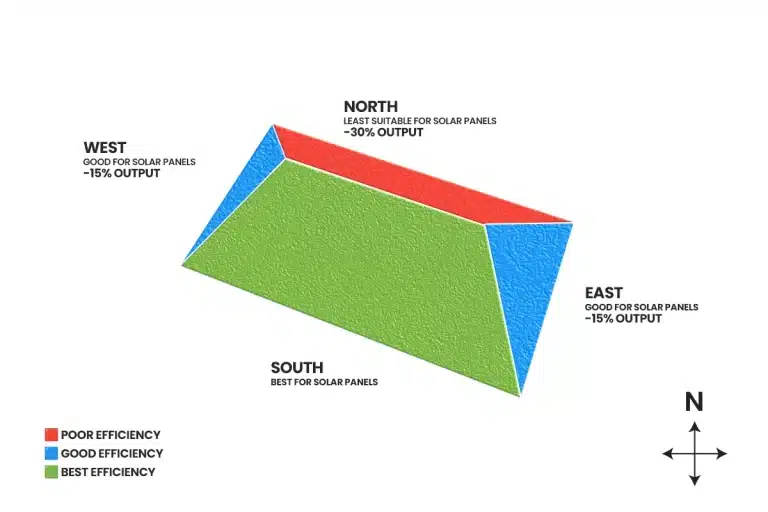- Updated On: May 28, 2025
Rooftop Solar System:
Is Your Roof Ready for Solar Installation?
Rooftop solar installation has become a popular choice for homeowners looking for grid independence, low electric bills, and maximum savings. According to the SEIA report, 97% of solar installations are on residential rooftops in the United States. Also, it is expected that there will be 10 million residential solar systems in the U.S. by 2030. Despite new solar tariffs and price hikes, homeowners understand the worth of a home solar system; hence, the trend is booming. Furthermore, the federal tax credit and other solar incentives support solar owners by reducing upfront expenses.

While considering major factors before switching to solar, like cost, financing options, system size, etc., it is pivotal to analyze, “Is my roof good for solar?” In fact, not every roof is ready for installing a PV system on it. Various factors like roofing material, age of roof, angles, shading, etc., impact your system efficiency. So, it is essential to check your roof compatibility and roof replacement in case your roof is not suitable for solar panels.
This article will help you evaluate your roof for solar installation. We will guide you on all solar roofing factors, like the best roof orientation and type of roofs, to maximize your panel’s performance.
Can you install solar panels on your roof?
When you plan for a rooftop solar install, the first thing you need to consider is the size of a home solar system. The system size depends on your unique energy requirements, and a larger system means more solar arrays, which require more roof space. So, it is essential to observe how many solar panels can fit on your roof.
In the U.S., a typical home requires 20-25 solar panels that may need space around 335-405 square feet. Also, the common roof size is about 1300 square feet, which is more than enough for a typical solar system. You can choose high-efficiency solar modules if you don’t have much roof space or you want to utilize them for other things. You can explore the best solar panels for your home here!
What are the top factors to consider before rooftop solar installation?
After analyzing your roof spacing, here are several checks to make sure that your roof is good for solar.

Roof Age:
Since solar panels’ lifespan is 25 to 35 years, you should make sure your roof is in good condition and won’t require replacement anytime soon. This is because roofing materials degrade in quality over time. Also, your roofing material may deteriorate more quickly if you live in a warmer state with direct sunlight. So, if your roof is close to the end of its useful life, you require roof replacement first. Many solar companies, like Solar SME, offer roof replacement services too with solar installation.
Roofing Material:
Although almost any type of roof can support solar panels, some materials are easier to deal with than others. Two of the most challenging roofing materials to install solar on are wood and slate because of their brittle nature. You need an expert solar installer near you, like SolarSME, Inc., for such rooftop solar installation, as it requires special types of equipment and processes. Asphalt shingles are typical roofs in U.S. homes. This is a good roof for installing solar panels. Also, the majority of tile roofs and some metal roofs make suitable solar foundations too. You can learn more about the best roofs for solar installation here!
Roof Angle:
Your location will also determine the best roof angle for solar panels. An angle of about 30 to 45 degrees is typical in the US, though it may change depending on your latitude. Installing panels at a right angle will optimize energy production all year round.
Roof Orientation:
The rooftop solar system’s output depends on the orientation of your roof. The best direction for solar panels in the Northern Hemisphere is south. Although true south is the ideal orientation for the roof, panels facing southeast and southwest also function effectively. However, east and west exposures are also possible, depending on shading, if you don’t have a southern sun exposure on your roof. Moreover, you can choose a residential solar carport or ground-mounted solar in case your roof direction is not good enough to maximize production.

Sun Exposure:
If you want to produce maximum solar power, your roof requires direct sun exposure. Sunlight from 9am to 3pm, every day of the year, is perfect for producing the most energy. Each state’s climate varies, but even the rainiest areas can benefit from solar energy production, as high-quality panels can convert indirect sunlight just as well as direct sunlight.
How does a shaded roof impact rooftop solar performance?
You may have the best roof with the right material or orientation, but if you reside alongside a tall building or some shaded area, it may not be a suitable roof for solar panels. Solar shading directly impacts the system’s efficiency. However, a certified solar installer can help you with the best solution. Explore more about the affects of shading performance of solar panels.
Rooftop Solar vs. Ground-Mounted Solar Installation: Which one is good?
When it comes to rooftop vs. ground-mount solar, both options are good and lead you to reap all the benefits of going solar. However, the only consideration is your specific energy needs and the solar energy system. A solar expert like Solar SME can help you design tailored solar designs to meet all your requirements. If your roof condition is good and you have unshaded space, rooftop solar is the best and comparatively cheap option for you. However, if your roof is not suitable for solar panels due to factors like space, orientation, age, etc., you can go with a ground-mounted solar system or a solar carport for efficient power production.
Is your roof ready for solar?
In conclusion, a compatible roof is vital for rooftop solar installation. Your investment may not be worth it even if you install the best PV system on a roof that needs replacement, is shaded, or has no space on required angles. It is highly recommended to consult with a certified solar installation company like Solar SME. Our experts examine your rooftop, evaluate all factors, and then make a tailored design to ensure solar efficiency. Get a FREE quote with our smart solar calculator for an estimate of your potential solar savings.
Related Articles:
In the United States, rising inflation, high energy costs, extreme weather, frequent power outages, and less grid reliance are the major reasons for switching to solar.
Are you tired of soaring energy bills and booming inflation? A solution is right above you – literally! Solar panels are an eco-friendly, cost-effective solution to control your energy costs.
If you have ever wondered how solar panels work you are not alone. People around the world have studied solar energy for nearly 200 years.



